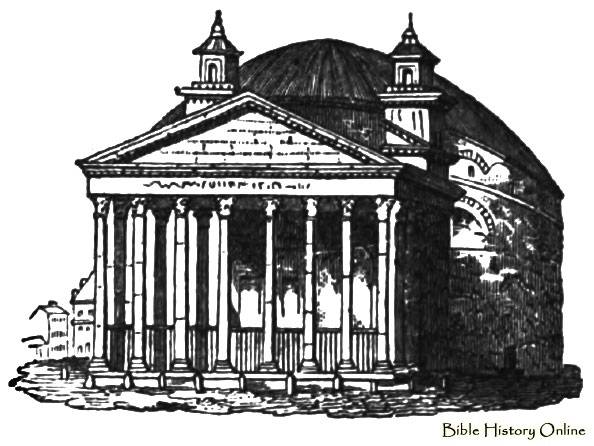
The Pantheon, or the temple of all the gods. It is the best preserved ancient building in Rome and is universally admired for its fine dome and beautiful columns.
Source:

The Pantheon, or the temple of all the gods. It is the best preserved ancient building in Rome and is universally admired for its fine dome and beautiful columns.
Source:
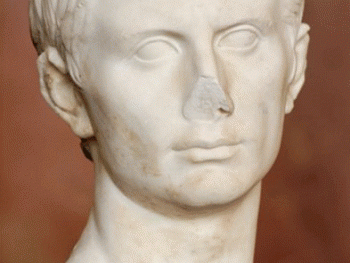
According to history the Emperor of Rome at the time of Jesus’ birth was Augustus. In 27 B.C., the Senate of Rome voted to give him the title Augustus, which means “the respected one.” He ruled the empire until 14 A.D. In the Bible Luke refers ...

In ancient Roman religion, Jupiter was the chief of the gods. The name “Jupiter” means “the best and greatest” (Optimus Maximus). He was identified with the Greek god Zeus. Jupiter was the spirit of the sky and worshiped as the god of thunder...

The ancient sun dial reveals the hours in a day. It has a surface with hour lines and a stick or gnomon which casts a shadow as the sun advances in its daily course. The sun dial is mentioned in the Bible as far back as the time of King Ahaz. Herodot...
Around 1000 BC David became king over Israel and conquered the Jebusites and stormed their fortress on Mount Zion (1 Sam. 5:5-9). Jerusalem became his home and the capital of his kingdom. He brought the Ark of the Covenant to the city and danced befo...
The ancient civilizations of the Incas and Aztecs left behind awe-inspiring cities and structures that continue to captivate our imagination. From the grandeur of Machu Picchu to the imposing pyramids of Teotihuacan, these remarkable achievements in ...
In the Bible, a watchtower, also known as a lookout or watchman's tower, was a raised structure used for surveillance and observation. It served as a strategic vantage point from which watchmen could keep watch over the surrounding area, looking out ...
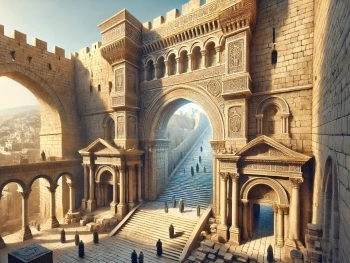
The Huldah Gates, located on the southern wall of the Temple Mount in Jerusalem, are a significant archaeological and historical feature. These gates served as entrances and exits for worshippers ascending to the Temple during the Second Temple perio...
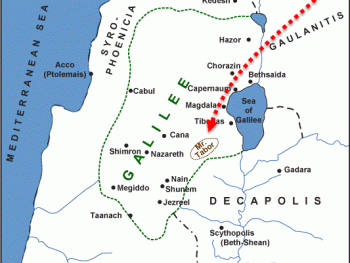
Matthew 17:1 – After six days, Jesus took with him Peter, James, and John his brother, and brought them up into a high mountain by themselves. In the 4th century AD a tradition was established that Mount Tabor was the scene of the transfiguration a...
The Persian Gulf marked the southeast corner of the world of the Old Testament, with the Caspian Sea marking the northeast corner. Many rivers flow into the Persian Gulf including the famous Tigris and Euphrates rivers. In Old Testament times the nor...
Ancient Greek mythology was rich with a pantheon of gods and goddesses, each associated with various domains, powers, and legends. Here are some of the major deities worshipped in ancient Greece: Zeus: The king of the gods and the ruler of Mount Olym...
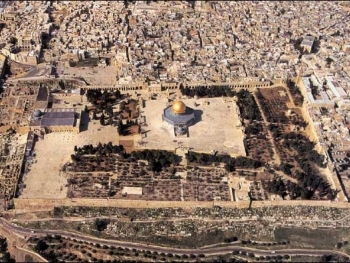
The etymology of the name Jerusalem is not certain; it is apparently of Semitic origin. An Egyptian notice from the third quarter of the nineteenth century B.C. mentions Urusalimum. The Assyrians called it Ursalimmu. Modern scholars take these names ...
The main powers in ancient Rome were Carthage, Greece, and Etrura. The Italian Peninsula is located right in the heart of the Mediterranean Sea. Rome is located right in the heart of Italy on a large plain known as Latium. Source: Latium and Geo...
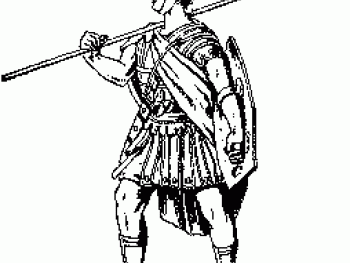
The weapons of a Roman solder included: the gladius (the short, straight, two-edged sword with which he would thrust rather than slash), and this he carried on a belt either from the shoulder or round the waist. He also carried the javelin “pilum�...
The name of Jesus, in its original language, was written in Hebrew as יֵשׁוּעַ (Yeshua) or יְהוֹשֻׁעַ (Yehoshua). In the New Testament, the name appears in Greek as Ἰησοῦς (Iēsous). The specific form used in the Bible depen...
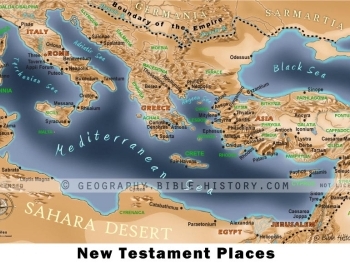
This map reveals the “Nations” within the ancient world during the first century A.D., the time of the New Testament. The New Testament world includes the areas of Israel, Asia, Greece, and Italy. During the life of Jesus his ministry took place ...
The Western Wall, also known as the Wailing Wall or Kotel, is a significant religious site in Jerusalem, Israel. It is a section of the retaining wall that once surrounded the Second Temple's courtyard and is revered as the most sacred site for Jewis...
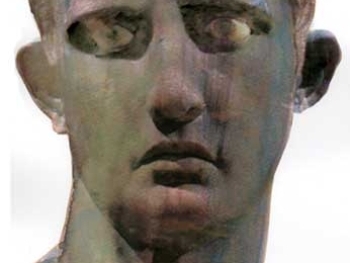
This bust was discovered by archaeologists at Meroe (Modern Sudan) and is currently in the British Museum. It depicts the face of the Roman Emperor Augustus who ordered the census just before the birth of Jesus. This brought the parents of Jesus (Jos...
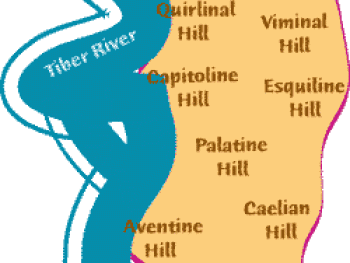
The seven hills of Rome were very noticeable in the landscape of the city of Rome. The hills were no higher than 60 yards, but they had steep slopes that rose above the flat marshland. Several small streams flowed between the seven hills. The names o...
Welcome to Free Bible: Unearthing the Past, Illuminating the Present! Step into a world where ancient history and biblical narratives intertwine, inviting you to explore the rich tapestry of human civilization.
Discover the captivating stories of forgotten empires, delve into the customs and cultures of our ancestors, and witness the remarkable findings unearthed by dedicated archaeologists.
Immerse yourself in a treasure trove of knowledge, where the past comes alive and illuminates our understanding of the present.
Join us on this extraordinary journey through time, where curiosity is rewarded and ancient mysteries await your exploration.




